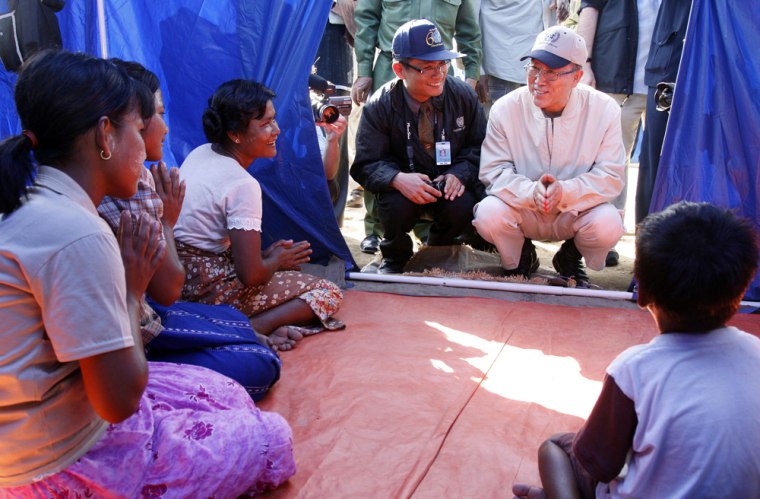Myanmar's military government agreed Friday to allow in "all" aid workers to help millions of cyclone victims, U.N. Secretary-General Ban Ki-moon said.
Ban met Senior General Than Shwe in his remote new capital of Naypyidaw for more than two hours to ask him to permit more foreign expertise for the victims of Cyclone Nargis.
"I had a very good meeting with the senior general and particularly on these aid workers," Ban said. "He has agreed to allow all the aid workers."
Asked by a reporter whether he considered it a breakthrough, Ban replied: "Yes, I think so, he has agreed to allow all aid workers regardless of nationalities."
The general had earlier refused to take Ban's calls from New York.
At the start of the meeting the 75-year-old general's stony-faced silence gave no clues as to whether he would overcome his deep suspicions of the outside world and its offers of help after the cyclone struck three weeks ago, leaving nearly 134,000 dead or missing.
Ban saw the extent of the disaster for himself on Thursday, flying in a helicopter over flooded rice fields and destroyed homes in the delta, the former "rice bowl of Asia" that bore the brunt of the May 2 storm and its 12 foot sea surge.
Cyclone Nargis one of the worst cyclones to hit Asia. Three weeks on, aid is still only trickling in due to the junta's restrictions on foreign relief operations.
'Don't lose your hope'
Unless the generals open their doors, thousands more people could die of hunger and disease, disaster experts say.
"I am so sorry, but don't lose your hope," Ban told one woman as he peered into a blue tent at the Kyondah relief camp 75 km south of Yangon.
"The United Nations is here to help you. The whole world is trying to help Myanmar."
Government officials told him the situation was under control, reiterating the line in army-controlled media that the immediate emergency relief phase of the disaster was over and it was now time to look to reconstruction.
"All efforts are being made towards the relief of the victims and for the country to soon return to normal," Energy Minister Brigadier General Lun Thi told Ban at the camp, the same one diplomats were shown at the weekend.
The junta has accepted relief flights into Yangon from many countries, including the United States, its fiercest critic, but has largely kept Western disaster experts out of the delta.
However, it has allowed a senior U.S. aid official on a 3-day government tour of the area. Washington said the permission was an "opening, but it is not sufficient."
Medical teams from India, China, Thailand, Laos and Bangladesh are working in the delta along with thousands of local medics and other volunteers, state media said.
Myanmar television also broadcast footage of Ban's official tour, showing shaking hands with and talking to survivors.
Prime Minister Thein Sein was quoted as saying "politics should not be intertwined with humanitarian needs" and the government was not impeding the flow of aid.
British Foreign Secretary David Miliband said there were no strings attached to offers of assistance.
'Man-made catastrophe'
"This is a humanitarian response being made to a natural disaster that is being turned into a man-made catastrophe. We are trying to send aid there for purely humanitarian purposes. There is no ulterior motive," Miliband said on a trip with U.S. Secretary of State Condoleezza Rice in California.
The U.N. and the 10-member Association of Southeast Asian Nations (ASEAN), of which Myanmar is a part, are preparing for a donor-pledging conference in Yangon on Sunday.
However, ASEAN Secretary-General Surin Pitsuwan said countries would be reluctant to commit money until they are allowed in to assess the damage for themselves.
"The shared concern is we don't know the extent of the damage. We don't know the number of the dead, the number of the missing or the number of the displaced," said Surin, who was told by officials that Myanmar needed $11 billion.
